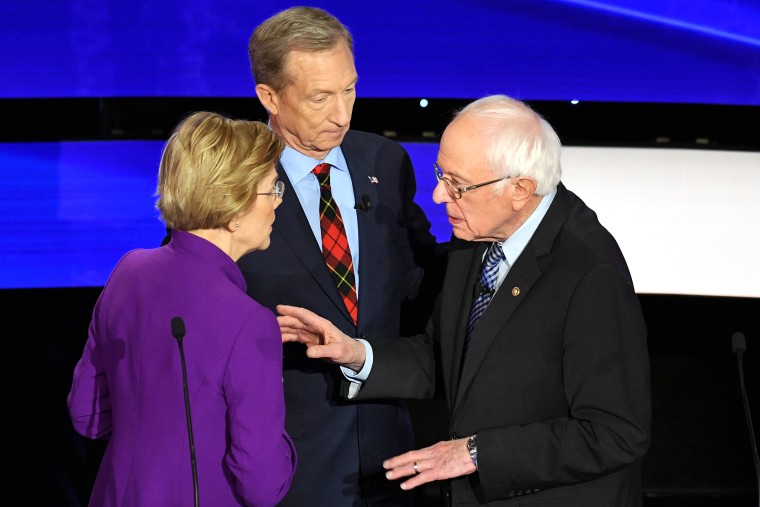In the lead-up to the Democratic presidential debate Friday night, I found myself reflecting frequently on last month's Bernie Sanders/Elizabeth Warren post-debate exchange, in which each accused the other of having called them a liar on national TV. Or, more precisely, I found myself ruminating on fellow candidate Tom Steyer's role in that pivotal moment.
For the massive quantities of ink spilled and tweets fired off about whether Sanders once told Warren that a woman couldn't win the presidency — and the resulting blaming, kvetching and hand-wringing — Steyer's awkward interruption and his swift exit, stage right, received nary a mention. Yet I've been unable to get it out of my mind.
Perhaps I am alone in obsessing about Steyer's reaction, which seemed to be a halfhearted and clumsy attempt to end the confrontation. But as the campaign heats up, I find myself ever more frequently in the role of Steyer, the unwitting witness to conversational bloodbaths marked by character assassination, blame, cancel culture, bad intentions and acrimony.
Sometimes, my perch is from afar; in other moments, it's firsthand, playing out among friends and colleagues over drinks on a Saturday night or in my ever-vibrant social media streams. Sometimes, I just want to plug my ears and pretend I'm not there; on other days, it's tempting to join the partisan fray and add one more click, "like" or snarky comment to the fire.
But more often than not, I'm just like Tom Steyer.
I utter an awkward or placating comment and exit expeditiously, stage right. My response resembles a grown-up version of the all-too-familiar image of a child watching from the stairs as her parents battle about finances or in-laws.
So in the run-up to the next prime-time debate, I considered how I might handle my own awkward Tom Steyer moments with a bit more aplomb than I have to date — and ideally prompt a more constructive conversation, some mutual learning or even, perhaps, a common understanding between warring parties. I drew on my years as a mediator and educator in conflict resolution and negotiation to come up with some strategies to help me and perhaps others who are likely to find themselves in similarly uncomfortable settings in the days and months ahead.
For me, it's important to start by conducting a self-audit. Rather than automatically yield to my fight-or-flight instincts, I need to take a deep breath and ask a few diagnostic questions: To what extent do I feel my blood pressure rising or adrenaline pumping because of my views on the topic? If I am feeling a strong emotional or even physical reaction, am I able to acknowledge it and then steady myself in a way that creates space for those in conflict to engage more productively? If I am unable to do so, what strategies can I employ to regain that emotional sobriety and mitigate against escalation or avoidance, neither of which are likely to be productive?
If I feel ready to intervene, I then need to consider my motivations. If my decision is driven simply by a hero complex or a need to feel that I "solved the problem," I may well be part of the problem. Only if I have something to add that might surface a deeper insight or promote more understanding and empathy should I intervene. Otherwise, what I might intend as a levelheaded mediation may be received as disingenuous or even patronizing.
And beyond yielding a "solution" or "agreement," it's important that any intervention helps the parties humanize each other. This might mean asking questions that allow parties to learn about the experiences, context, histories and values that are often at the source of their divergent viewpoints, rather than simply papering over the dispute or pretending that agreement exists where it does not.
Accordingly, any intervention needs to focus first on the feelings in the room, not the alleged facts. This is not to say that facts don't matter; it's just that starting there will likely cause trouble, at least in part because "facts" are often framed as "truth," both of which are prone to be selective and susceptible to divergent interpretations about what information is worthy of attention.
In contrast, one "shared" experience that parties at each other's throats usually have is the emotions involved. It's hard to watch Sanders and Warren's interaction and not sense their shared feelings of betrayal, anger, disappointment and disbelief. Focusing on these common reactions means focusing on something deeply universal, so this humanizes the "other" — an action that tends to be constructive in getting parties to avoid escalation — in a moment when we are inclined to demonize them.
I find myself ever more frequently in the role of Steyer, the unwitting witness to conversational bloodbaths marked by character assassination, blame, cancel culture, bad intentions and acrimony.
Helping parties recognize their mutual humanity can also create a willingness to view the opposing narrative in a more nuanced, and perhaps even sympathetic, light. That's important, because most people, even ones we dislike, aren't Hollywood villains. A sense of shared humanity can, in fact, spark curiosity about a perceived nemesis — prompting a thought such as: "How has this person come to adopt a view that I see as pernicious or even repugnant?" Such a question may not seem like progress, but I submit it is. Curiosity, after all, can invite engagement and conversation. Certainty, alternatively, leads to deadlock, dehumanization and escalation.
Keeping these tips in mind isn't going to ensure that the awkward Tom Steyer moments I will surely face as the campaign heats up will suddenly melt into magical moments of grace and harmony. But having a strategy for them might increase the likelihood of more salubrious results, in which acrimony turns to listening, certainty turns to curiosity and differences become sources of strength and growth, not just struggle and discord. And that would be a huge step in the right direction.


